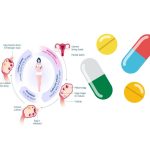List of 6 Drugs That Can Stop Bleeding

Menstrual bleeding is a natural part of the menstrual cycle in people with female reproductive systems and is caused by the shedding of the uterine lining. Menstrual bleeding typically lasts for several days and is characterized by bright red blood that may be accompanied by small clots or tissue fragments.
The length and heaviness of menstrual bleeding can vary from person to person and can be influenced by factors such as age, hormonal fluctuations, and underlying medical conditions. In general, menstrual bleeding that lasts longer than 7 days, or is very heavy or painful, may be a sign of a problem and should be evaluated by a healthcare provider.
Heavy menstrual bleeding or menorrhagia is a common menstrual disorder that affects many women. The exact number of women who experience heavy menstrual bleeding varies depending on the definition used for heavy bleeding, but it is estimated that up to one-third of women experience HMB at some point in their reproductive years.
The International Federation of Gynecology and Obstetrics (FIGO) defines HMB as menstrual blood loss greater than 80 mL per cycle, while the American College of Obstetricians and Gynecologists (ACOG) defines it as menstrual bleeding that lasts longer than seven days or requires changing pads or tampons every one to two hours. Using the ACOG definition, it is estimated that up to 10% of women experience HMB.
HMB can be caused by a variety of factors, including hormonal imbalances, uterine fibroids, polyps, adenomyosis, and blood clotting disorders, among others. It can significantly impact a woman’s quality of life, causing fatigue, anemia, and missed days of work or school.
If you are experiencing heavy menstrual bleeding or other menstrual symptoms that are impacting your quality of life, it’s important to speak with a healthcare provider for evaluation and treatment options.
List Of Medicine To Stop Menstrual Bleeding
There are several medications that can be used to stop or reduce menstrual bleeding, depending on the underlying cause and severity of the bleeding. Some common medications include:
1. Nonsteroidal anti-inflammatory drugs (NSAIDs): NSAIDs such as ibuprofen and naproxen can help reduce menstrual bleeding by decreasing the production of prostaglandins, which are hormone-like substances that can cause cramping and bleeding. These medications can also help alleviate other symptoms of menstruation such as cramping and bloating. NSAIDs should be taken with food to avoid stomach upset, and they should not be taken for extended periods of time without the guidance of a healthcare provider.
2. Tranexamic acid: This medication works by slowing down the breakdown of blood clots and reducing bleeding. It is often used to treat heavy menstrual bleeding. Tranexamic acid is usually taken orally in tablet form, and it should be taken as directed by a healthcare provider. Side effects may include nausea, diarrhea, and headaches.
The dosage of tranexamic acid for bleeding varies depending on the severity and cause of the bleeding, as well as the patient’s medical history and other medications they may be taking.
For menstrual bleeding, the usual recommended dose of tranexamic acid is 1 gram orally two or three times daily during heavy bleeding days, starting as soon as bleeding begins and continuing for up to five days. The maximum daily dose should not exceed 4 grams. However, the dosage may vary based on individual factors, and it’s important to follow the dosing instructions provided by your healthcare provider.
For bleeding associated with surgeries or trauma, the dosage of tranexamic acid may be higher and administered intravenously. The dosage and administration of tranexamic acid for these conditions should be determined by a healthcare provider.
It’s important to note that tranexamic acid may interact with other medications and may not be suitable for everyone. Before taking tranexamic acid, it’s important to speak with a healthcare provider to determine the appropriate dosage and to discuss any potential risks or side effects.
3. Oral contraceptives: Birth control pills contain hormones that can help regulate menstrual bleeding and reduce the amount of bleeding. They work by suppressing ovulation and thickening the cervical mucus, which can make it more difficult for sperm to reach the egg. Birth control pills can also help alleviate other symptoms of menstruation such as cramping and bloating. They should be taken as directed by a healthcare provider, and may have side effects such as nausea, breast tenderness, and mood changes.
The dosage of oral contraceptives for bleeding varies depending on the type of pill and the patient’s individual medical history and needs.
Most oral contraceptives contain a combination of estrogen and progestin hormones and are taken for 21 days, followed by a seven-day break, during which time a withdrawal bleed occurs. Some oral contraceptives are also available in extended-cycle regimens, where active pills are taken for up to 84 days, followed by a break of seven days or inactive pills.
For women who experience heavy menstrual bleeding, a healthcare provider may prescribe a specific type of oral contraceptive pill that contains a higher dose of estrogen or progestin to help reduce bleeding. The dosage of these pills varies depending on the specific brand and type, but typically involves taking one pill daily at the same time each day for 21 or 84 days, followed by a break or inactive pills.
It’s important to note that oral contraceptives may not be suitable for everyone and may interact with other medications or medical conditions. Before taking oral contraceptives for menstrual bleeding, it’s important to speak with a healthcare provider to determine the appropriate dosage and to discuss any potential risks or side effects.
4. Progestin-only contraceptives: These contraceptives, which include the mini-pill, implant, and injection, contain a synthetic form of the hormone progesterone, which can help reduce menstrual bleeding. Progestin-only contraceptives work by thickening the cervical mucus, which can make it more difficult for sperm to reach the egg. They may also help alleviate other symptoms of menstruation such as cramping and bloating. Progestin-only contraceptives should be used under the guidance of a healthcare provider, and may have side effects such as irregular bleeding, headaches, and weight gain.
The dosage of progestin-only contraceptives for bleeding varies depending on the type of contraceptive and the individual patient’s medical history and needs.
Progestin-only contraceptives include pills, injections, and intrauterine devices (IUDs). Progestin-only pills, also known as “mini pills,” contain only progestin and are taken daily at the same time each day. The dosage of progestin in these pills may vary depending on the specific brand and type, but typically involves taking one pill daily for 28 days with no break. For women who experience heavy menstrual bleeding, a healthcare provider may prescribe a specific brand or dosage of progestin-only pill to help reduce bleeding.
Progestin-only injections, such as Depo-Provera, are administered every three months and contain a higher dose of progestin than progestin-only pills. The dosage and administration of progestin-only injections for bleeding should be determined by a healthcare provider.
Progestin-only IUDs, such as Mirena, release a small amount of progestin directly into the uterus and are effective at reducing heavy menstrual bleeding. The dosage and administration of progestin-only IUDs for bleeding should be determined by a healthcare provider.
It’s important to note that progestin-only contraceptives may not be suitable for everyone and may interact with other medications or medical conditions. Before taking progestin-only contraceptives for menstrual bleeding, it’s important to speak with a healthcare provider to determine the appropriate dosage and to discuss any potential risks or side effects.
5. Gonadotropin-releasing hormone (GnRH) agonists: These medications work by reducing the production of estrogen, which can help reduce menstrual bleeding. They are typically used for short periods of time and can have side effects such as hot flashes and bone loss. GnRH agonists may also cause a temporary increase in menstrual bleeding before the bleeding decreases.
6. Danazol: This medication is a synthetic hormone that can help reduce menstrual bleeding by suppressing ovulation and reducing the production of estrogen and progesterone. Danazol is not used as frequently as other medications, as it can have side effects such as weight gain, acne, and mood changes. It should only be used under the guidance of a healthcare provider.
Non-Medicinal Ways To Stop Menstrual Bleeding
There are several non-medicinal ways to manage menstrual bleeding, but it’s important to note that these methods may not necessarily stop bleeding completely. Some non-medicinal ways to manage menstrual bleeding include:
1. Changing menstrual products: Using tampons or menstrual cups may help reduce the amount of blood that is visible and may help prevent leakage.
2. Applying heat: Placing a heating pad or hot water bottle on the lower abdomen or lower back can help alleviate menstrual cramps and may help reduce bleeding.
3. Exercise: Light exercise such as walking or yoga can help improve blood flow and reduce menstrual cramps.
4. Dietary changes: Eating a balanced diet that is rich in iron and other nutrients can help support the body during menstruation. Drinking plenty of water and reducing caffeine and alcohol intake may also help alleviate menstrual symptoms.
5. Stress reduction: Practicing stress reduction techniques such as meditation, deep breathing, or yoga can help reduce menstrual cramps and may help regulate menstrual cycles.
It’s important to note that if menstrual bleeding is heavy or prolonged, it’s important to seek medical attention. Heavy bleeding can lead to anemia, which can cause fatigue and other health complications. If non-medicinal methods do not alleviate menstrual bleeding or symptoms, it’s important to speak with a healthcare provider about other treatment options.





